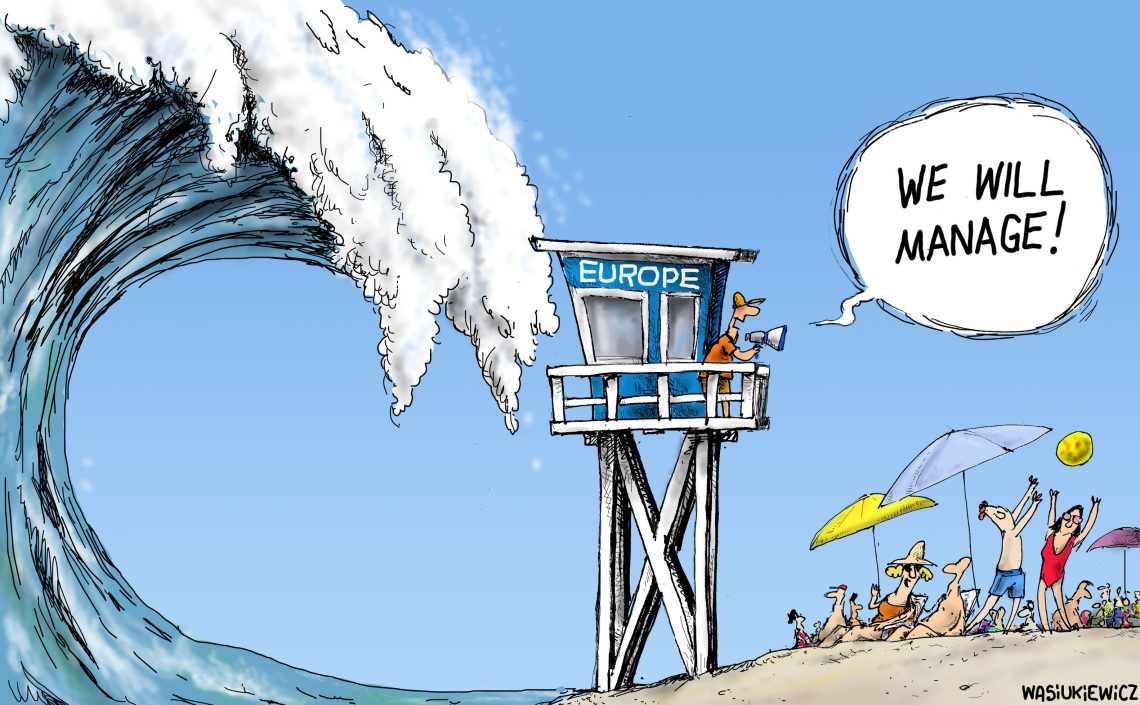A disastrous pattern in Western foreign policy
Recurring blunders in Western policy have had catastrophic consequences in Ukraine, Georgia and Africa.

Last week, Washington finally allowed Ukraine to use American equipment to attack some targets inside Russia. Heeding the signal from the United States, Chancellor Olaf Scholz dropped his resistance and approved the same for German-made weapons.
The Western approach to foreign and security policy in Europe consistently follows three principles: ignore the problem and do nothing, make the wrong decisions by choosing the path of least resistance, and act too little, too late. We see this pattern when it comes to Ukraine, Georgia and migration from Africa.
Indecision on Ukraine
This misguided approach recently allowed Russia to advance toward Kharkiv, capturing territory that will be difficult for the Ukrainians to regain, as well as resulting in massive casualties and enormous destruction. After the decision on U.S. weapons, Russia is now certain to escalate.
The roots of this madness trace back to the 2008 NATO summit in Bucharest, where Georgia and Ukraine were offered membership. Russia took it as a provocation, but there was no immediate follow-through from NATO’s side.
When Russia occupied Crimea and parts of the Donbas in 2014, the U.S. and Western Europe responded with sanctions. Attempts at dealmaking occurred through the Normandy format and the Minsk agreements, which no one respected, leading to a low-intensity war. Sanctions, the path of least resistance, unsurprisingly failed to break Russia. Nevertheless, Western capitals felt satisfied that they had done something. At the time, GIS experts recommended that Europe increase its defense capacities to deter Moscow. European leaders deemed such a move unnecessary.
More from Prince Michael of Liechtenstein on Europe’s mistakes
- European defense is not merely about Russia
- Europe should focus on its own defense readiness, not on Trump
- How to stop Europe’s downward spiral
The full-scale invasion of 2022 surprised many in the West and Ukraine. Initially, Western leaders supported Ukraine’s fight but wanted to avoid direct confrontation with Russia. They delivered precious little equipment – but did tighten sanctions. Ukraine’s agony continued. Bit by bit, the West increased aid, but not enough to truly push back the aggressor.
The Ukraine conflict might end in exhaustion, leading to a cease-fire and frozen conflict. This would undermine Ukraine’s territorial integrity and Western credibility. And here we see the effects of that typical, disastrous sequence: ignore, make the wrong decisions, and act too little, too late.
Abandoning Georgia
The case of Georgia is also dramatic and has some similar patterns to what happened with Ukraine. But there is an additional element here. When President Mikheil Saakashvili came to power in 2004, Georgia was extremely poor, bureaucratic and corrupt. Mr. Saakashvili implemented reforms to streamline the administration and economy. He recognized that an oversized bureaucracy and excessive regulations stifled economic growth and fostered corruption. He drastically reduced the size of the public administration and simplified laws and regulations to the bare essentials. Corruption significantly decreased, the country successfully embraced digitalization and the economy began to thrive.
Narrow-minded European technocrats disliked this approach, to say the least. Branding Mr. Saakashvili an autocrat, they offered little support. This allowed the opposition party Georgian Dream, funded by a pro-Russian oligarch, to take power. The former president was eventually imprisoned.
Now, despite huge public resistance, the Georgian government has passed legislation that restricts the activities of Western-backed media and think tanks. With it, Georgia could be lost to the West for good. Meanwhile, European governments remain silent about the inhumane conditions Mr. Saakashvili faces in prison.
An incoherent approach to Africa
For a long time, Europe rather ignored the issues of its southern neighbor, Africa, bribing it with ineffective development aid. It was a bad decision, but again, it allowed the donors to feel self-satisfied. The lack of engagement allowed Chinese and Russian influence to grow at the expense of European interests. Europe turned a blind eye to positive examples like Turkish foreign policy and infrastructure initiatives. Instead, it maintained an arrogant, paternalistic attitude.
Migration streams served as a wake-up call. Governments did not want to simply open the floodgates, but Europe refused to implement any coherent policy or precise measures. The most productive step would have been to support European business investments and trade with Africa, while applying political pressure to protect those assets. A socialist values system got in the way and the EU turned to protectionism, especially through non-tariff barriers, which undercut trade.
The most recent blunder is the EU’s supply chain directive, which sets unrealistic ecological and human rights obligations, making trade and investment in Africa too risky. This bureaucratic nightmare, with draconian fines, exemplifies Europe’s self-destructive tendencies.
Peace through strength
A good foreign policy strategy consists of anticipating and addressing situations before they evolve into a threat. Simply reacting when circumstances become critical – or even after it is too late – is disastrous.
A compromise in Ukraine will only embolden Russia to reconstitute Soviet-era borders or create satellite states. Western indecision could spark an even larger war. Europe must become more assertive, showing clear foreign and security policies and a willingness for deterrence.
Only with strength and determination can Europe establish or reestablish good relations with its neighbors to the east and south – a long-term necessity. The illusion that peace can be preserved without weapons must be abandoned.

